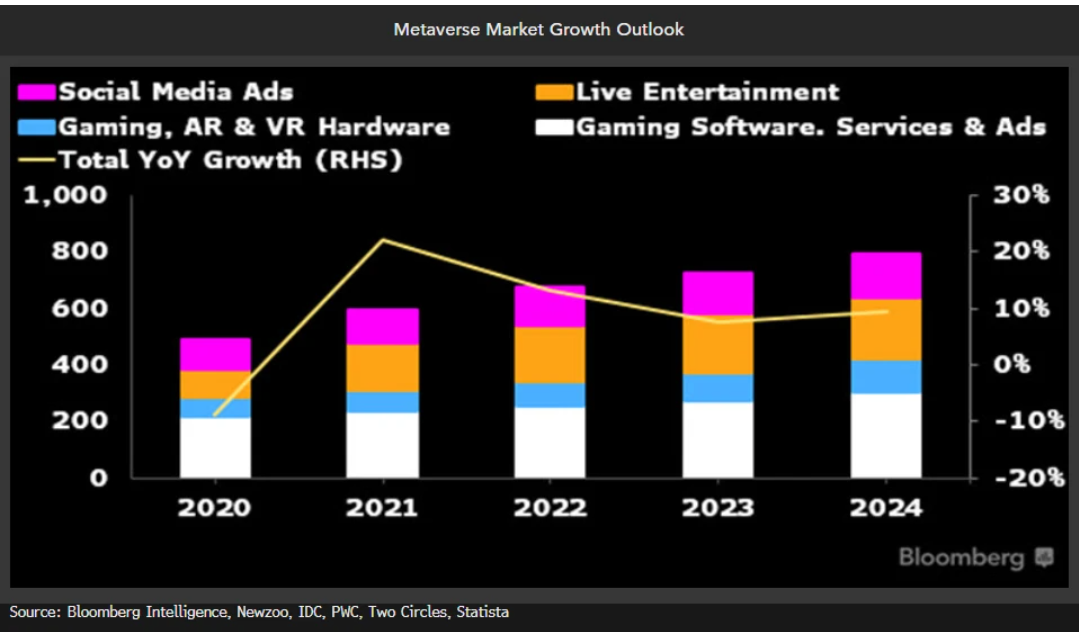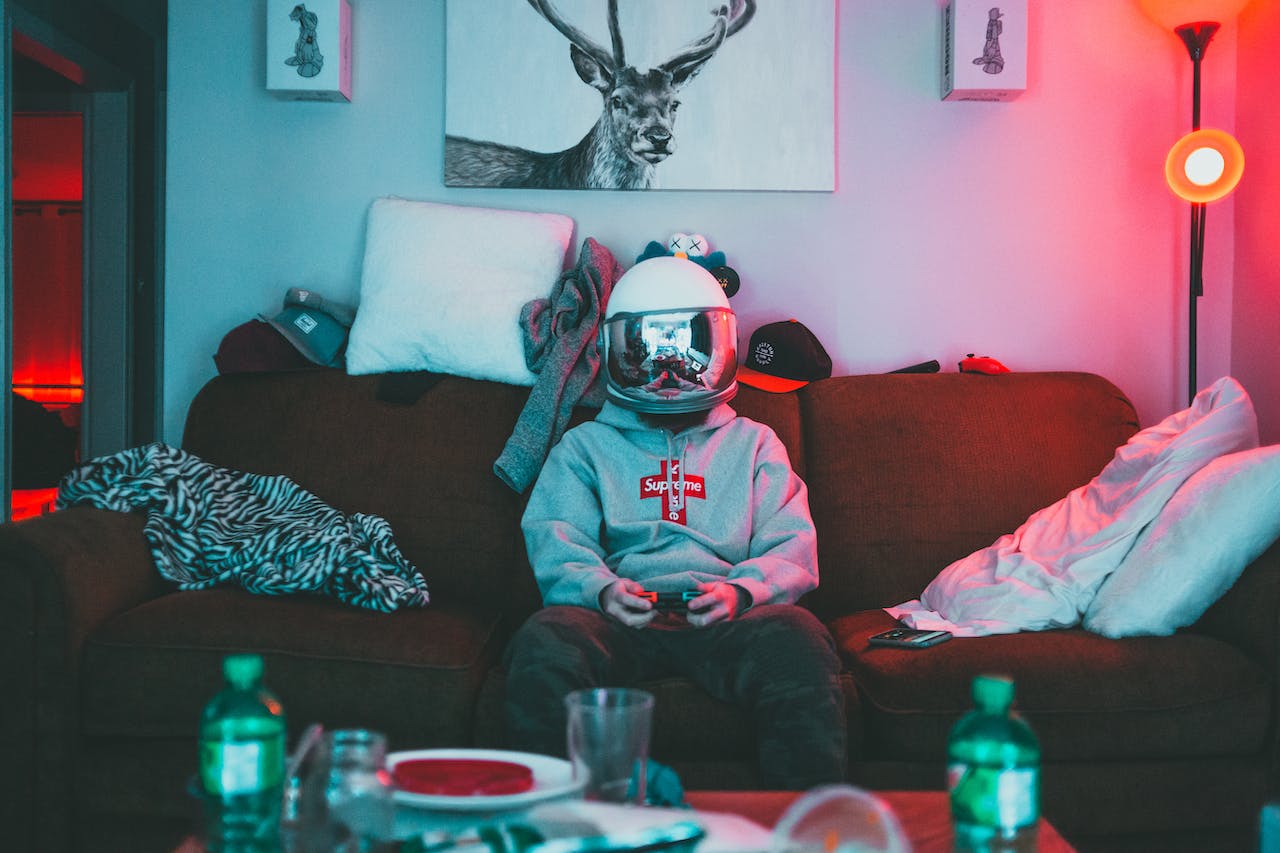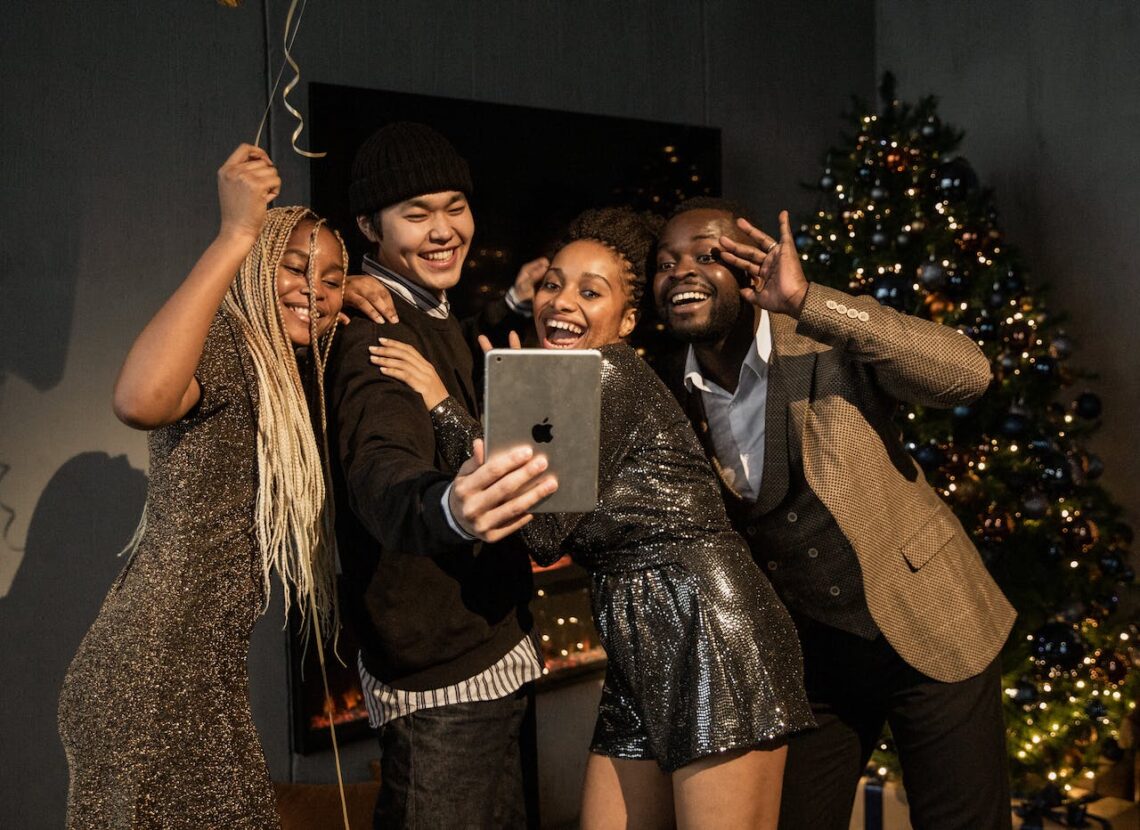The metaverse, once confined to science fiction, has emerged as the next big thing in technology and is even being hailed as the future of the internet. While it’s challenging to predict the metaverse’s ultimate form, think of it as a network of virtual worlds that use real-time 3D technology and other emerging metaverse technologies for various activities.
In essence, the metaverse refers to an immersive virtual actuality version of the internet. So, what is metaverse exactly? It is the next evolution of connecting online through shared virtual spaces and experiences.
In today’s metaverse, people can attend virtual work meetings, concerts, and conferences. They can also buy virtual land, create digital personas, trade NFTs, and purchase virtual and real-world items. As the metaverse grows, experts predict it could become an $800 billion industry by 2024.

The metaverse is set to grow significantly, allowing brands to tap into consumer trends and discover fresh ways to connect with their audience through emerging metaverse technologies. One effective method for brands to reach their target audience in the metaverse is through influencer marketing. As metaverse technologies evolve, partnering with influencers may help brands stay forward and successfully engage users in virtual spaces.
Brands have invested heavily in influencer marketing, with an annual spending that reached up to $15 billion by 2022. However, as we entered the metaverse, I anticipated three major shifts in how brands, influencers, and their audiences would interact and collaborate, potentially transforming this marketing strategy.
What Does Influencer Marketing Mean in the Metaverse?

In the metaverse, influencer marketing is like teaming up with popular people to promote a brand. But here, influencers can even be computer-made characters with human fans, which differs from how it works on the internet.
In the metaverse, there’s a new type of influencer who connects deeply with their audience. There are a few ways brands can work with them:
- Sponsored Fun: Brands can join forces with metaverse influencers whose followers are interested in their products. For example, a sports brand can partner with a metaverse influencer who wears their digital sportswear and leads virtual workouts.
- Virtual Product Placement: Brands can get featured in the metaverse by teaming up with influencers. Imagine a fashion brand teaming up with a metaverse designer to showcase their clothes in a live video. An influencer marketing agency in India can facilitate these mutually beneficial partnerships.
- Virtual Parties: Brands can invite famous influencers to special metaverse events and show them off to their followers. A game company could work with an influencer to broadcast their virtual game tournament.
Cyber Celebrities
Virtual influencers, or digital or AI influencers, are computer-generated characters created for marketing purposes, primarily focusing on social media marketing instead of human influencers. These virtual personas maintain a social media presence and engage with the online world as real individuals.
India’s First Virtual Influencer – Kyra
- Kyra, India’s first virtual influencer, made her soft debut in 2021 and was officially launched on January 28, 2022.
- She’s based in Mumbai, with a following of 242K fans on Instagram.
- Kyra’s self-description in her Instagram bio is ‘dream chaser, model, and traveler.’
- She has been featured on the digital cover of Travel and Leisure, India, and has collaborated with brands like Amazon Prime Video, boAt, and John Jacobs.
Brand-Developed Avatars
- Brands are increasingly exploring developing branded avatars as digital influencers using metaverse technologies.
- This approach allows companies like Prada and Yoox to meticulously craft the influencer’s appearance, personality, and messaging.
- The customization ensures alignment with the brand’s values and target demographic. With full control over their avatar influencers, brands can optimize engagement by leveraging the latest metaverse technologies and immersive experiences.
Unique Opportunities with Digital Influencers
- Digital influencers present unique opportunities for brands to engage with consumers authentically.
- In virtual spaces like the metaverse, branded avatars can interact with audiences in personal, immersive ways that foster affinity and loyalty.
What Kinds of Influencers Find the Metaverse Appealing?
Gamers, streamers, celebs, and social media stars largely dominate the metaverse influencer scene. These digital trendsetters will shape the content we see in the metaverse. They aim to produce engaging material for specific niches – gaming fans or particular game communities. Then, they distribute it as widely as possible.
Some influencers have established their whole personal brand around the metaverse, like Diego Borgo, a metaverse expert, NFT collector, and consultant to major companies. Others gained traction online first before expanding into different virtual spaces. But they all champion gaming, tech, and digital culture.
Brands must evaluate the landscape to find partners who can build relationships through engagement and trust in the metaverse. The ideal metaverse influencer has authority in their niche, an authentic voice, and access to targeted communities. They should also have a strong understanding of emerging metaverse technologies and how to create compelling experiences that resonate with their followers.
The Metaverse Shift is a Necessity for Influencers

The Disruption of the Brand Structure
The emergence of the metaverse is disrupting traditional brand structures and marketing strategies. It is blurring the lines between the virtual and real worlds, as brands sell both physical and digital goods.
Gucci and Ralph Lauren now offer virtual versions of their products, like clothes and accessories, in metaverse environments. This opens up new opportunities for brands to engage with consumers in immersive ways. Instead of traditional advertisements, brands can partner with metaverse influencers for virtual sponsorships, collaborations, and activations.
For example, Wendy’s created a virtual restaurant in Roblox where users can earn and spend virtual currency. The metaverse requires brands to rethink their approaches to stand out.
The Changing Role of Influencers
Influencers have an evolving role to play in the metaverse landscape. Some are transitioning to become virtual CGI influencers with large followings, like Lil Miquela, who has over 3 million Instagram followers and promotes real brands.
Human influencers provide brands access to engaged niche communities, like gaming streamers who give brands exposure to their gaming fanbases. Influencers also serve as guides to the metaverse, offering tours and introducing their followers to popular platforms powered by emerging metaverse technologies.
As virtual worlds grow, influencers become crucial curators and connectors between brands and metaverse users. Partnering with metaverse influencers skilled at leveraging these new technologies will be key for brands developing marketing strategies in virtual spaces.
The Emergence of New Means of Communication for Influencers
The metaverse unlocks new forms of communication, engagement, and storytelling for influencers. They can host virtual events, concerts, and activations with brand partners. Ariana Grande and Travis Scott have performed concerts in Fortnite and Roblox. Influencers also leverage digital fashion to create unique avatar looks and promote brands.
Immersive storytelling formats like interactive pride parades, stores, and games allow influencers to develop creative branded content and campaigns. The possibilities are endless for how influencers can leverage the metaverse to engage their audiences creatively.
Future of Influencer Marketing in the Metaverse
Evolution of Technology
- Enhanced Immersion: Advancements in metaverse technology, including augmented reality (AR), virtual reality (VR), and haptic feedback, will create more immersive experiences for influencers and their audiences.
- Integration of Blockchain: Blockchain technology and NFTs will enable influencers and brands to tokenize and authenticate virtual assets, fostering trust and new monetization opportunities.
Increase in Time Spent in the Metaverse
- Proliferation of Platforms: With more metaverse platforms and experiences, users will spend increasingly more time in this virtual space, providing a larger and more engaged audience for influencer marketing.
- Extended Content Opportunities: Longer user sessions in the metaverse will open up opportunities for influencers to create more extensive and multifaceted content, leading to deeper connections with their followers.
Rise of Virtual Influencers

- Emergence of Digital Personalities: Virtual influencers, who are entirely computer-generated, will become a significant part of influencer marketing. These entities offer a new dimension for brand collaborations and may appeal to niche audiences.
- Lifelike Realism: Advances in AI and 3D modeling will make virtual influencers appear increasingly lifelike, blurring the line between human and digital personalities.
AI-Powered Virtual Influencers
- Enhanced Personalization: AI-driven virtual influencers will have the capability to deliver highly personalized content and recommendations to their audience, improving engagement and brand messaging relevance.
- Scalability: AI-powered influencers can be scaled more efficiently than human influencers, allowing brands to reach broader and more diverse demographics.
Metaverse Advertising and Commerce
- Integrated Shopping Experiences: The metaverse will offer seamless shopping experiences within virtual environments, enabling influencers to showcase and sell products directly to their followers.
- Augmented Reality Try-Ons: Virtual influencers will use AR to permit users to try on products before making purchasing decisions.
Legal and Ethical Frameworks
- Regulations and Guidelines: As influencer marketing in the metaverse evolves, regulatory bodies and industry organizations will establish guidelines to govern these activities, ensuring transparency, data privacy, and ethical practices.
- Intellectual Property Rights: Addressing intellectual property concerns, content ownership, and copyright issues will be a critical aspect of influencer marketing in the metaverse.
Conclusion
The metaverse is changing how brands can team up with influencers. As these virtual worlds keep growing and evolving with new metaverse technologies, partnering with metaverse creators and personalities will be crucial for every company’s strategy. There will be sponsored virtual experiences, digital product placements, and virtual events that brands can collaborate on with influencers skilled in these spaces.
The metaverse also opens the door for CGI influencers – think virtual avatars that can be brand ambassadors. This digital influencer trend is just getting started and will get even bigger. For marketers, this new space creates fresh opportunities to build relationships with people, do engaging collaborations, and spread their brand far and wide.
Brands must figure out where they fit in and who they should work with within the metaverse as it keeps advancing. The name of the game is being creative with influencer partnerships. Brands that think outside the box will crush it with audiences in the metaverse.
FAQs
What types of influencers will be most prominent in the metaverse?
Gaming, tech, and VR/AR influencers will likely gain prominence, along with virtual influencers, digital fashion influencers, and influencers who create immersive experiences.
How will influencer content change for metaverse campaigns?
Influencers may create more interactive content, digital events, AR/VR experiences, gaming collaborations, and virtual merchandise lines and enable digital twinning.
What new partnership opportunities will emerge for brands?
Brands can partner with influencers on virtual concerts, digital pop-up shops, in-game brand integrations, avatar promotions, NFT collections, and more.
How will influencer marketing metrics change?
Metrics like virtual goods sales, social engagement within metaverse platforms, digital branded experience participation, and avatar impressions will gain relevance.





